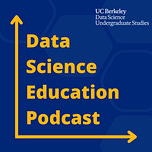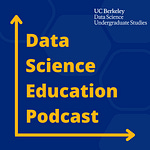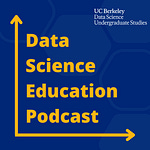Access the full transcript for this episode
“We introduce a new data set to them every week, and we try and use data sets that are either themed around Illinois, or themed around things that we think that they are interested in. And so that's been something that we started doing when we first piloted the course, and have continued to do that each semester. And the students really are invested in the course, because they're using real world data that they have questions about.”
—Karle Flanagan
In this episode, we explore the creation and growth of STAT 107, the University of Illinois Urbana-Champaign’s introductory data science course designed to be accessible to all students, regardless of major or background. We sat down with Karle Flanagan and Wade Fagen-Ulmschneider, the teaching professors behind STAT 107, to discuss their journey from a pilot program with 18 students to a thriving course with 1000+ students today. They detail how they built a curriculum that combines computer science and statistics, while keeping students engaged through real-world datasets, interactive live demos, and interdisciplinary collaboration. They delve into the challenges of scaling the course, the importance of co-teaching, and their broader efforts to expand data science education to high schools through initiatives like the DPI Digital Scholars Program.
“So in the very beginning, we actually started by being like, there's going to be a CS day and a Stat day, and that I would give a CS lecture, and then Karle would be there, kind of just sitting in the audience, and then Karle would give a Stat lecture the next day, and they'd be inner related, but they were kind of separated. And then one day, we were just like, I want to kind of get Karle's opinion on something and let give her perspective, because I come from an engineering background, and I am obsessed with formulas. Karle, I think, really relies more on, like, tables and graphs and like, really wants to understand the story behind data, and only once you're motivated by the story do you really want to dive in deeper. And so the way we see problems are wildly different…Students just love the fact that it's back and forth.”
—Wade Fagen-Ulmschneider










